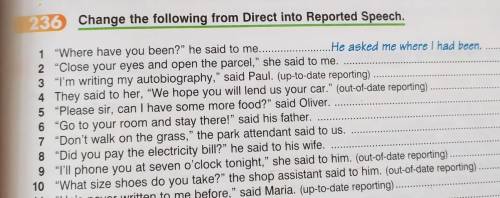Change the following from Direct into Reported Speech.
пример : "Where have you been?" he said to me He asked me where I had been.
2 "Close your eyes and open the parcel," she said to me.
3 "I'm writing my autobiography," said Paul. (up-to-date reporting)
4 They said to her. "We hope you will lend us your car." (out-of-date reporting)
5 "Please sir, can I have some more food?" said Oliver.
6 "Go to your room and stay there!" said his father.
7 "Don't walk on the grass," the park attendant said to us
8 "Did you pay the electricity bill?" he said to his wife.
9 "I'll phone you at seven o'clock tonight," she said to him. (out-of-date reporting)
10 "What size shoes do you take?" the shop assistant said to him. (out-of-date reporting).

Другие вопросы по теме Английский язык
Популярные вопросы
- -Юнлэ мен Токугава билігі Батыс билеушілерінің билігіндей шексіз болды...
3 - 1. Іменник виконує роль додатка в реченні: АГроза проходила десь поруч....
1 - Нужно сочинение-миниатюра на тему Идёт волшебница зима (8 класс), но...
1 - На какие размышления навела тебя сказка и какая Какие чувства вызвало...
1 - Образуйте сравнительную степень составную форму от прилагательного сложный...
2 - Сила тяготения ,действующая на тело,зависит...
1 - Мәтіндік есептерді теңдеулермен шығару. 3-сабақ Әлия концертке уақытында...
1 - Повесть неге жусан иісі дер аталған?...
3 - Кто возглавил освободительное движение в Украине?...
1 - Упражнение 5. Соотнесите слово и его значение мне...
1
Explanation: In the direct speech, the speaker is giving a command "Close your eyes and open the parcel." In the reported speech, we change the command to an indirect request by using the verb "asked" and the infinitive form of the verb "to close" and "to open".
3. Paul said that he was writing his autobiography. (up-to-date reporting)
Explanation: In the direct speech, Paul said "I'm writing my autobiography." In the reported speech, we use the subordinating conjunction "that" to introduce the reported statement and change the verb tense to past continuous ("was writing") to match the original statement.
4. They told her that they hoped she would lend them her car. (out-of-date reporting)
Explanation: In the direct speech, the speaker said "We hope you will lend us your car." In the reported speech, we use the verb "told" and the conjunction "that" to introduce the reported statement. We also change the verb tense to past tense ("hoped" and "would lend") to match the original statement.
5. Oliver asked if he could have some more food.
Explanation: In the direct speech, Oliver said "Please sir, can I have some more food?" In the reported speech, we use the verb "asked" and the conjunction "if" to introduce the reported question. We also change the word order to make it a more indirect question.
6. His father told him to go to his room and stay there.
Explanation: In the direct speech, his father said "Go to your room and stay there!" In the reported speech, we use the verb "told" and the infinitive form of the verbs "to go" and "to stay" to give a command.
7. The park attendant told us not to walk on the grass.
Explanation: In the direct speech, the park attendant said "Don't walk on the grass." In the reported speech, we use the verb "told" and the infinitive form of the verb "to walk" to give a prohibition.
8. He asked his wife if she had paid the electricity bill.
Explanation: In the direct speech, he said "Did you pay the electricity bill?" In the reported speech, we use the verb "asked" and the conjunction "if" to introduce the reported question. We also change the verb tense to past perfect tense ("had paid") to match the original statement.
9. She told him that she would phone him at seven o'clock that night. (out-of-date reporting)
Explanation: In the direct speech, she said "I'll phone you at seven o'clock tonight." In the reported speech, we use the verb "told" and the conjunction "that" to introduce the reported statement. We also change the verb tense to past tense ("would phone") to match the original statement.
10. The shop assistant asked him what size of shoes he took. (out-of-date reporting)
Explanation: In the direct speech, the shop assistant said "What size shoes do you take?" In the reported speech, we use the verb "asked" and the conjunction "what" to introduce the reported question. We also change the verb tense to past tense ("took") to match the original statement.